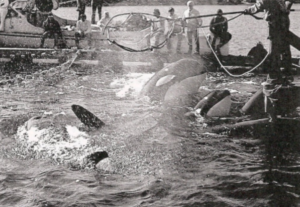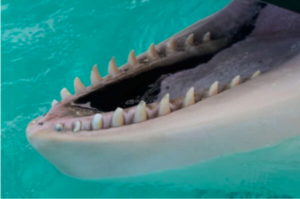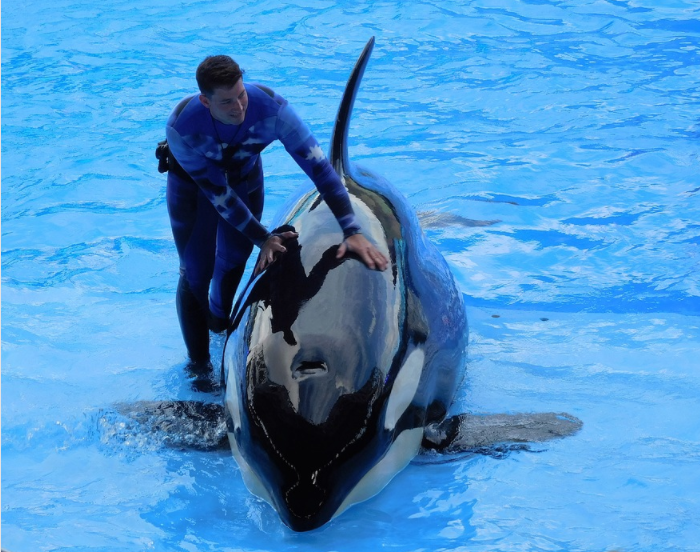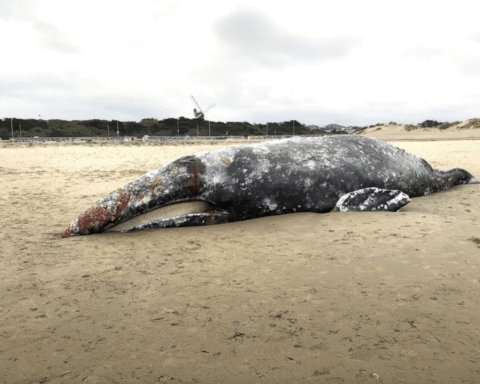In a concrete tank four times her length, a 51-year-old apex mammalian predator with a brain more than two times the size of a human, Lolita the orca, paces back and forth exhibiting an indomitable spirit.
Lolita was abducted from the Salish Sea on August 8, 1970 in Penn Cove, Whidbey Island, Washington. She is the only living captive orca, of 45 members from looting the Southern Resident pod, during the gruesome pillage of 1967 to 1973. At least 13 members of her family were brutally suffocated during these ghastly captures.

There is every reason to believe that Lolita is suffering horrendously.
Lolita has been forced to perform for 47 years at the Miami Seaquarium. She exists in a tiny bathtub-like tank in solitary confinement. No human could bear these abhorrent conditions yet still regularly carry on for almost five decades.
In 2006, my colleagues discovered that orcas, the largest and most widespread of all dolphins, possess spindle cell neurons. These specialized brain cells (neurons) in human beings are known to convey emotions and enable social interactions including empathy, compassion, love, speech, language as well as pain including grieving.
Moreover, in my latest book Save Nature Now, I detail that an individual human neuron is indistinguishable from that of an orca, elephant or honeybee. The differences are attributed to the degree of combination and its enhanced properties. Ladies and gentlemen, we are all one.
For more than a quarter of a century, The Orca Project and others including more recently, People for the Ethical Treatment of Animals (PETA), have worked ceaselessly to return Lolita to the Salish Sea.
In January, 2018, the 11th U.S. Circuit Court of Appeals in Miami rejected claims by PETA and others that imprisoning Lolita in a tiny tank violated the federal Endangered Species Act.

It is heartbreaking that Lolita must endure the puniest concrete tank in North America. At times the depth of this chamber drops from 20 to 11 feet. Furthermore, these uninhabitable conditions (especially for a large mammal) are causing Lolita to gnaw at the gates, which have worn her teeth down to the gum-line exposing nerve tissues causing excruciating pain. Incidentally, in Nature when orcas teeth wear down, they die.

Lolita suffers from a lack of shade, and just like people, she gets sunburnt. By the way, when Hurricane Irma barreled into Miami in September 2017 and hundreds of thousands of people evacuated the city, Lolita was abandoned in her naked prison cell.
These magnificent, highly intelligent and evolved creatures roam 75 miles a day and dive hundreds of feet into the sea. Orcas live in a matriarchal society where mothers, aunties, children, children’s children, and males live their entire lives together. Mother-child bonds are life-long. In no other creatures do daughters and sons stay with their mothers for the duration of her life.
Males live in the wild for about 50 years. Females undergo menopause around the age of 45. Only orcas, short-finned pilot whales, and female humans are known to experience this. Older female orcas become excellent surrogate aunties. Females can live for 105 years. They, like matriarchal elephants, possess ecological wisdom guiding the family through lean feeding times by remembering food sources.
Capturing orcas, imprisoning and enslaving them to achieve tricks to amuse humans are morally wrong.
How do we end Lolita’s plight?
We reintroduce Lolita to her brothers and sisters, and her mother (Ocean Sun), a matriarch, who is 90-years-old, by first placing Lolita in a sea-pen near Whidbey Island before releasing into her pod.
Lolita’s pod will recognize her signature whistle; orcas have phenomenal brains that retain long-term memory.
The Lummi Nation of Western Washington State has begun the legal paperwork under the 1855 Treaty of Point Elliot to bring Lolita – a critically endangered species – home to the Salish Sea.
As famed oceanographer and explorer Jacques Cousteau wrote, “when we return wild animals to Nature — we merely return them to what is theirs. For man cannot give wild animals freedom, they can only take it away.”
Your return time is finally coming Lolita and millions of caring, compassionate, animal-loving people from around the globe are cheering you on!
#Resist
•••••••••••••••••••••••••••••••••••••••••••••
Dr Reese Halter is a treehugger, storyteller, award-winning broadcaster, distinguished conservation biologist and author.
Dr Reese Halter’s latest book is
Save Nature Now
Tweet @RelentlessReese












